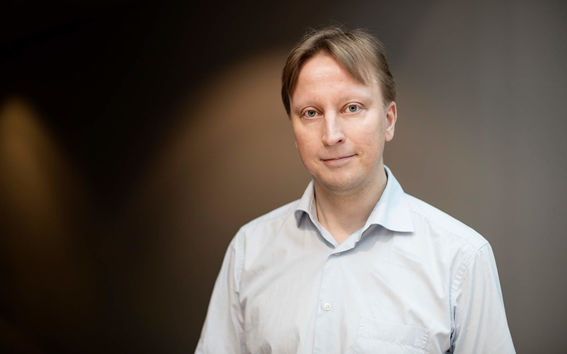Simo Särkkä: Sensor data guides robots and helps with care of premature infants

Professor Simo Särkkä, what do you research and why?
I lead the Sensor Informatics and Medical Technology research group. Sensors are generally small measuring instruments and nowadays they can be found almost everywhere: in buildings, clocks, phones, cars, and so on.
There are typically multiple sensors in a device, and they therefore produce contradictory and noisy data. Our task is to model the data so that we can obtain a clear overall picture from it. This picture, for example, allows a robot to know what kind of environment it is in, or a self-driving car to report where on the road it is currently located.
One of our most important areas of application is medical technology. For example, we have worked with Helsinki University Central Hospital to improve the care of premature infants. The hospital unit uses sensors to collect data on, for example, the breathing, oxygen saturation, and heart rate of premature babies. The data is used to produce models that allow doctors to react more quickly to any changes in the condition of premature babies that require actions to be taken.
How did you become a researcher?
Signal processing has always fascinated me, as has measuring and mathematics. After graduation, I worked in industry on research tasks, and I started my doctoral dissertation alongside my work – until I finally returned to full time research.
What have been the highlights of your career?
Completing my doctoral dissertation was certainly one highlight. The dissertation dealt with stochastic differential equations, which are the mathematical models upon which sensor signal processing is based. I am also proud of the books I have published, of which many are used for teaching in the field.
What is required from a researcher?
Above all, patience. Things started today are not ready tomorrow. Ideally, a publication can be produced in a year, but the journey from research to application can easily take ten years, even in the electronics field – and in medical technology even twice as long as this.
What do you expect from the future?
I hope that our research will help to make sensors a more central component of more and more fields of work. Challenges remain in communication between sensors, and solving these problems is an important part of, for example, the development of self-driving vehicles.
In medical technology, we are working on improving, for example, treatment of heart diseases. Some heart problems can be easily detected with a single measurement, but often measurements are needed over a longer period of time. In this, a key role is played by sensors and the processing of the data they produce.
Simo Särkkä and Aalto’s other new tenured professors will speak about their research at the Installation Talks event on 30 October. The presentations are presented in non-technical language and are open to all. See you there! Further information is available here.
Read more news

Learning to slow down: cold-water swimming benefits explored in new study
Swimming in cold water offers a temporal slowdown, promoting stress management and mental clarity that lingers long after the experience, says research from Finland.
The proxy server for remote access to e-resources is changing
If you have problems using e-resources, try accessing the e-resource using VPN connection.
A sustainable city is also age-friendly
Cities must involve older adults more strongly in the planning of the urban environment.






